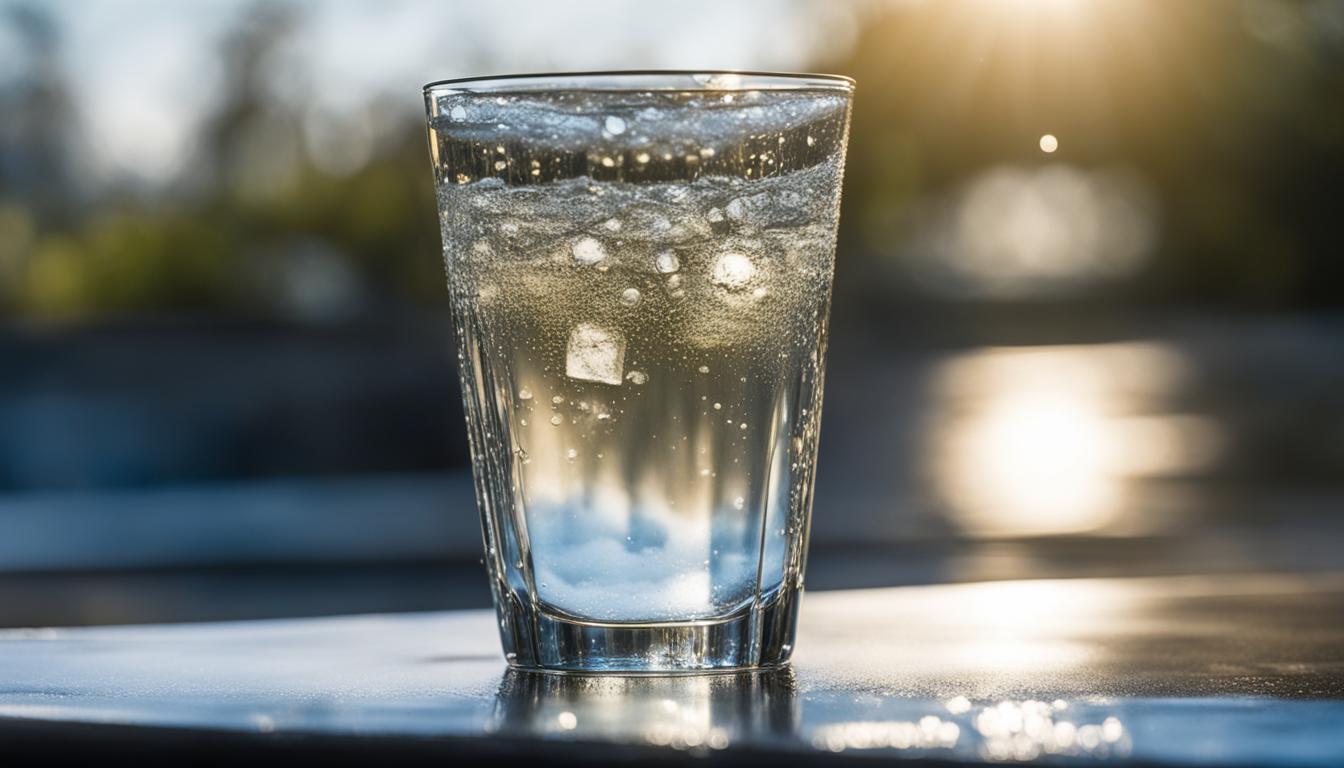Proper hydration is not just about quenching your thirst; it plays a vital role in maintaining your overall health and well-being. The benefits of staying hydrated extend far beyond simple water consumption. From boosting heart function and enhancing skin elasticity to improving mental clarity and productivity, hydration is a cornerstone of a healthy lifestyle.
Unfortunately, many Americans suffer from chronic dehydration, which can lead to a range of negative effects on the body. While drinking enough water is crucial, it’s important to understand that there are other ways to stay hydrated. Consuming hydrating foods and beverages can also contribute to your daily hydration needs. Striking a balance is essential, as overhydration can lead to complications like hyponatremia.
Key Takeaways:
- Proper hydration is crucial for overall health and well-being.
- Staying hydrated benefits heart function, skin elasticity, mental clarity, and productivity.
- Many Americans are chronically dehydrated, leading to negative health effects.
- Consuming hydrating foods and beverages is important for maintaining hydration.
- A balance must be struck to avoid overhydration and its complications.
The Dangers of Dehydration and Overhydration
Dehydration and overhydration are two extremes that can have severe consequences for our health. It’s important to understand the risks associated with both and take necessary precautions to prevent them.
When it comes to dehydration, the effects can be far-reaching. Chronic dehydration can lead to symptoms such as mental fog, overeating, and increased stroke risk. It can also take a toll on our physical performance and overall well-being. That’s why it’s crucial to stay hydrated by drinking an adequate amount of water throughout the day.
On the other hand, overhydration can be just as dangerous. When we drink excessive amounts of water, it can dilute our body’s electrolyte balance and result in a condition called hyponatremia. This can lead to symptoms such as nausea, headache, confusion, and in severe cases, seizures or coma. Endurance athletes, in particular, need to be cautious as they often consume large amounts of water during intense exercise.
To prevent dehydration, it’s important to drink water regularly and listen to our body’s signals of thirst. It’s recommended to consume around 8 cups (2 liters) of water per day for optimal hydration. However, it’s equally important not to go overboard and overhydrate. Striking the right balance is key to maintaining our body’s fluid levels and staying healthy.
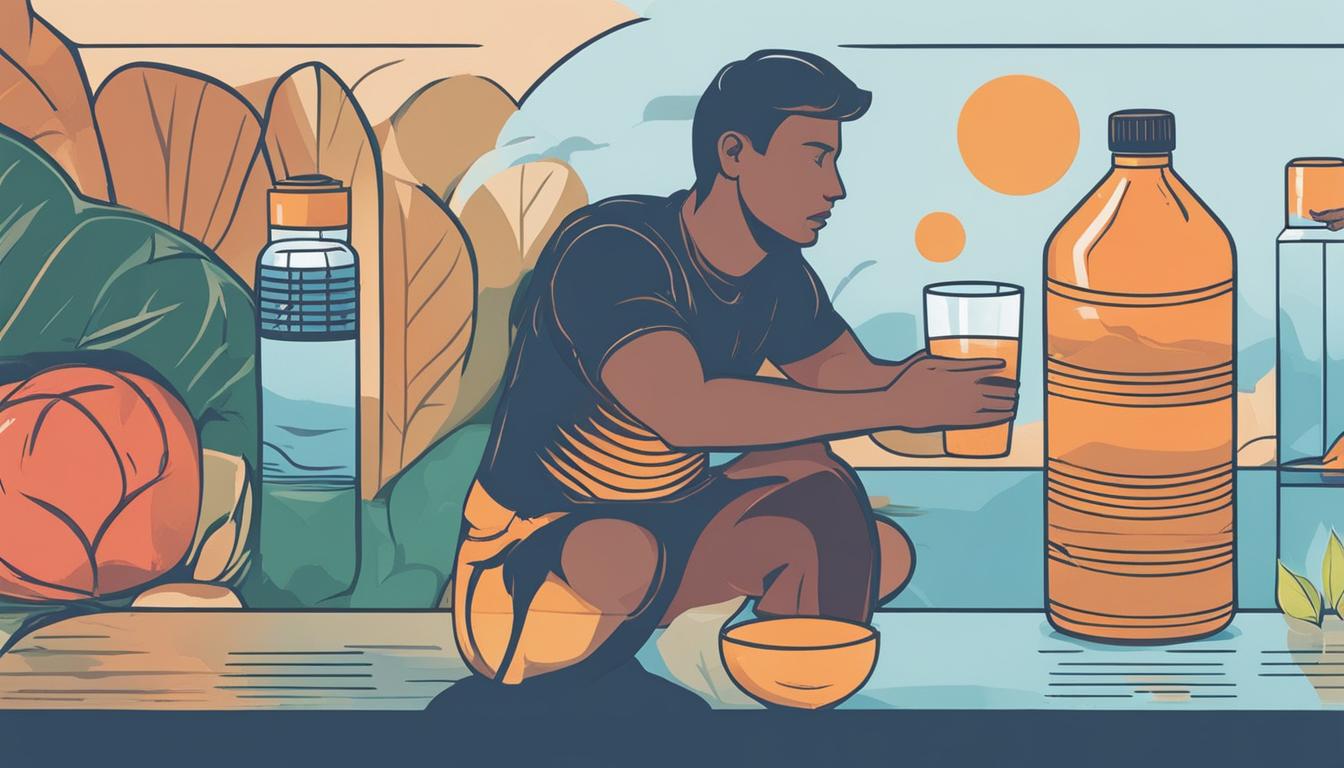
The Role of Water and Electrolytes in Hydration
When it comes to hydration, water is undoubtedly essential. However, it’s important to understand that water alone does not provide all the necessary elements for optimal hydration. Electrolytes, such as sodium, calcium, potassium, chloride, phosphate, and magnesium, play a crucial role in maintaining fluid balance in the body.
Electrolytes are minerals that carry an electric charge and are involved in various bodily functions, including muscle contractions, nerve signaling, and fluid balance. When we sweat, we not only lose water but also these electrolytes. That’s why it’s crucial to replenish them alongside water to maintain a proper hydration balance.
One way to ensure an adequate intake of electrolytes is to consume foods and drinks that naturally contain them. Foods like bananas, spinach, avocados, and yogurt are excellent sources of potassium. Similarly, sodium can be obtained from foods like pickles, olives, and broth. Including these electrolyte-rich foods in your diet, along with staying hydrated with water, can help maintain the desired fluid balance in your body.
Hydration Balance and Electrolyte Supplements
For individuals who engage in intense physical activity or have specific health conditions, additional electrolyte supplementation may be necessary. Electrolyte supplements are available in various forms, including powders, tablets, and liquids. These supplements can provide an extra boost of electrolytes to support hydration balance during periods of increased fluid loss.
However, it’s important to note that electrolyte supplements should be used as a complement to a well-rounded diet and not as a replacement. It’s always best to consult with a healthcare professional or a registered dietitian to determine if electrolyte supplementation is necessary for your specific needs.
By understanding the role of water and electrolytes in hydration, you can make informed choices to maintain a healthy fluid balance in your body. Remember to stay hydrated by drinking water throughout the day and incorporating electrolyte-rich foods into your diet. Whether it’s through natural sources or supplements, finding the right balance is key to optimized hydration.
How Much Water Should You Drink?
Proper hydration is essential for overall health, but how much water should you actually be drinking? The recommended daily water intake varies for individuals based on various factors such as activity level, health conditions, and gender. It’s important to understand your daily hydration needs to maintain optimal health and well-being.
Generally, men are advised to drink around 13 cups (3 liters) of water per day, while women should aim for approximately 9 cups (2 liters). Keep in mind that these numbers can vary depending on individual circumstances. For example, pregnant women and breastfeeding mothers have higher water needs and should consult their healthcare provider for personalized recommendations.
It’s important to note that water intake should be adjusted based on individual factors. Factors such as climate, exercise intensity, and certain medical conditions can impact your hydration needs. If you engage in vigorous exercise or live in a hot and humid climate, you may need to increase your water intake to account for the additional fluid loss through sweating.
Hydration Tips:
- Carry a reusable water bottle with you throughout the day to stay hydrated on the go.
- Eat hydrating foods like watermelon, tomatoes, and cucumbers to support your hydration levels.
- Drink water before, during, and after exercise to replenish the fluids lost through sweat.
- Consider flavoring your water with a slice of lemon or lime if you find it difficult to drink plain water.
- Establish a hydration schedule and set reminders to ensure you’re meeting your daily water intake goals.
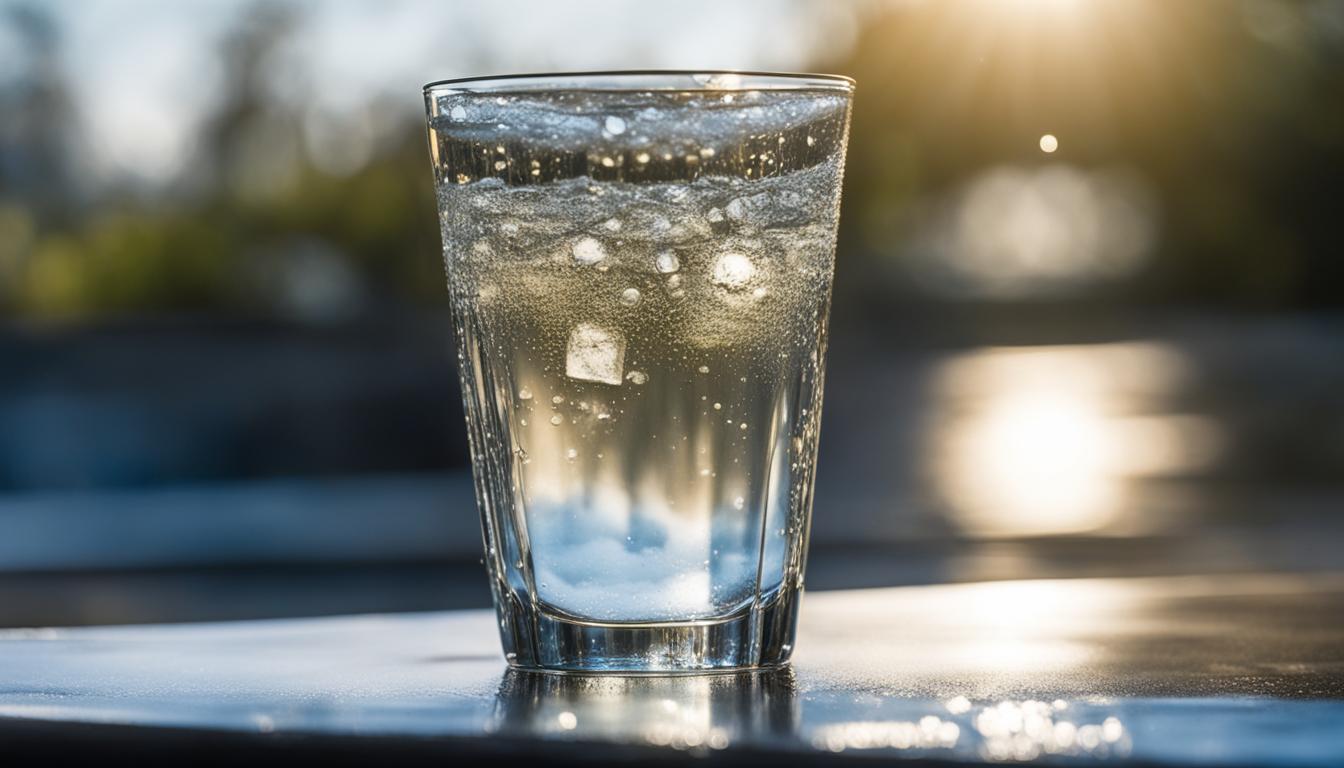
Remember, water is not the only source of hydration. Other fluids like herbal tea, milk, and certain fruits and vegetables also contribute to your overall fluid intake. By staying mindful of your hydration needs and incorporating these tips into your daily routine, you can ensure you’re meeting your recommended water intake and promoting a healthy lifestyle.
Hydration Tips for Daily Life
Staying hydrated is essential for your overall health and well-being. Here are some helpful tips to help you stay hydrated throughout the day:
1. Carry a reusable water bottle:
Keep a reusable water bottle with you wherever you go. This will serve as a reminder to drink water regularly and make it convenient for you to stay hydrated on the go.
2. Eat hydrating foods:
Incorporate hydrating foods into your diet, such as watermelon, tomatoes, and beans. These foods have high water content and can contribute to your overall hydration levels.
3. Drink water before, during, and after exercise:
If you engage in physical activity, it’s important to drink water before, during, and after your workout to replenish the fluids lost through sweat and maintain proper hydration.
4. Add flavor to your water:
If you find it difficult to drink plain water, try adding a slice of lemon or lime to your water for a refreshing taste. This can make drinking water more enjoyable and encourage you to stay hydrated.
By following these simple tips, you can ensure that you stay properly hydrated throughout the day, supporting your overall health and well-being.
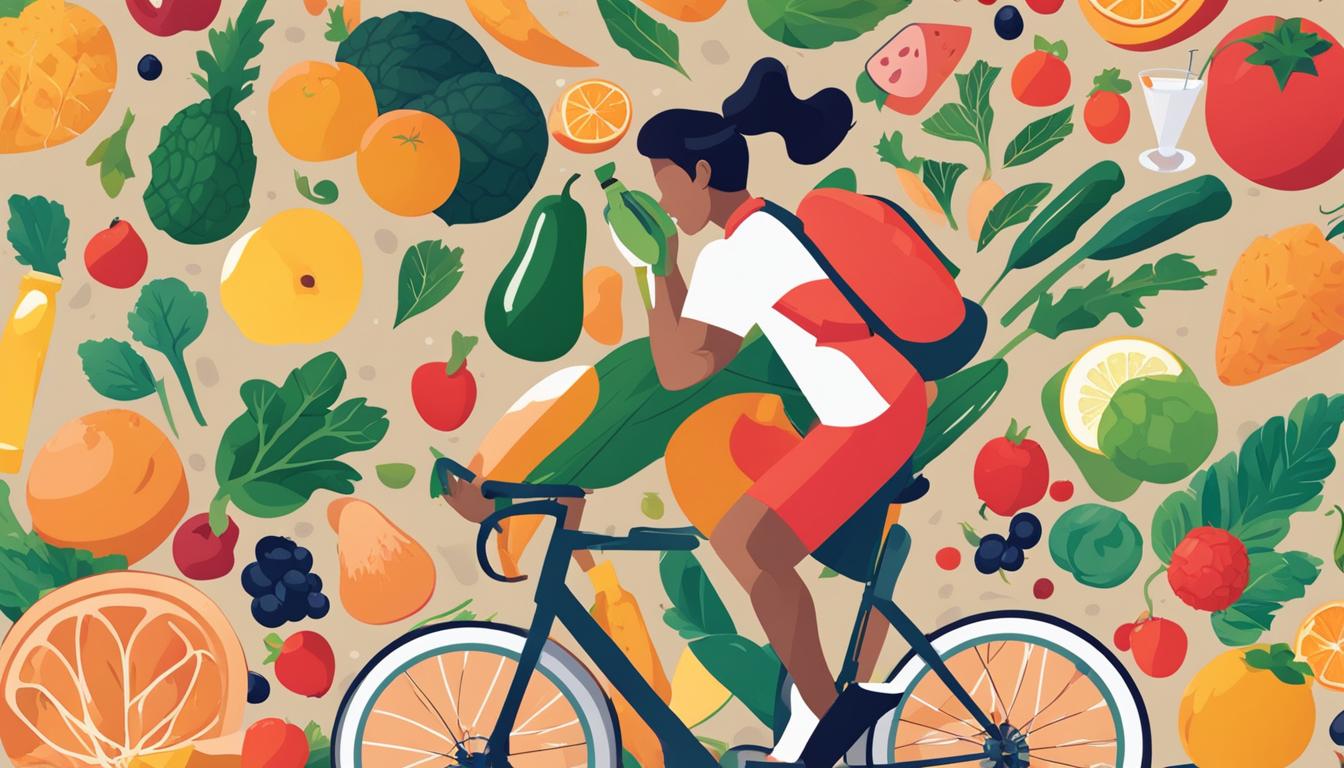
The Impact of Caffeine on Hydration
Caffeine is a widely consumed substance found in coffee, tea, and soda. Many people rely on these beverages to provide them with a much-needed energy boost throughout the day. But have you ever wondered how caffeine affects your hydration levels?
Contrary to popular belief, moderate consumption of caffeinated drinks does not cause significant fluid loss or lead to dehydration. While caffeine does have a diuretic effect, meaning it can make you urinate more frequently, it does not offset the hydrating properties of the fluid you consume.
“Moderate consumption of caffeinated drinks does not cause significant fluid loss or lead to dehydration.”
However, it is essential to consume caffeinated drinks in moderation and be mindful of your overall fluid intake. Excessive caffeine intake can lead to headaches, restlessness, and difficulty sleeping, which can indirectly affect your hydration levels.
To maintain proper hydration, it is recommended to include water as your primary source of fluids. If you choose to consume caffeinated drinks, consider balancing them with an equal amount of water to ensure adequate hydration throughout the day.
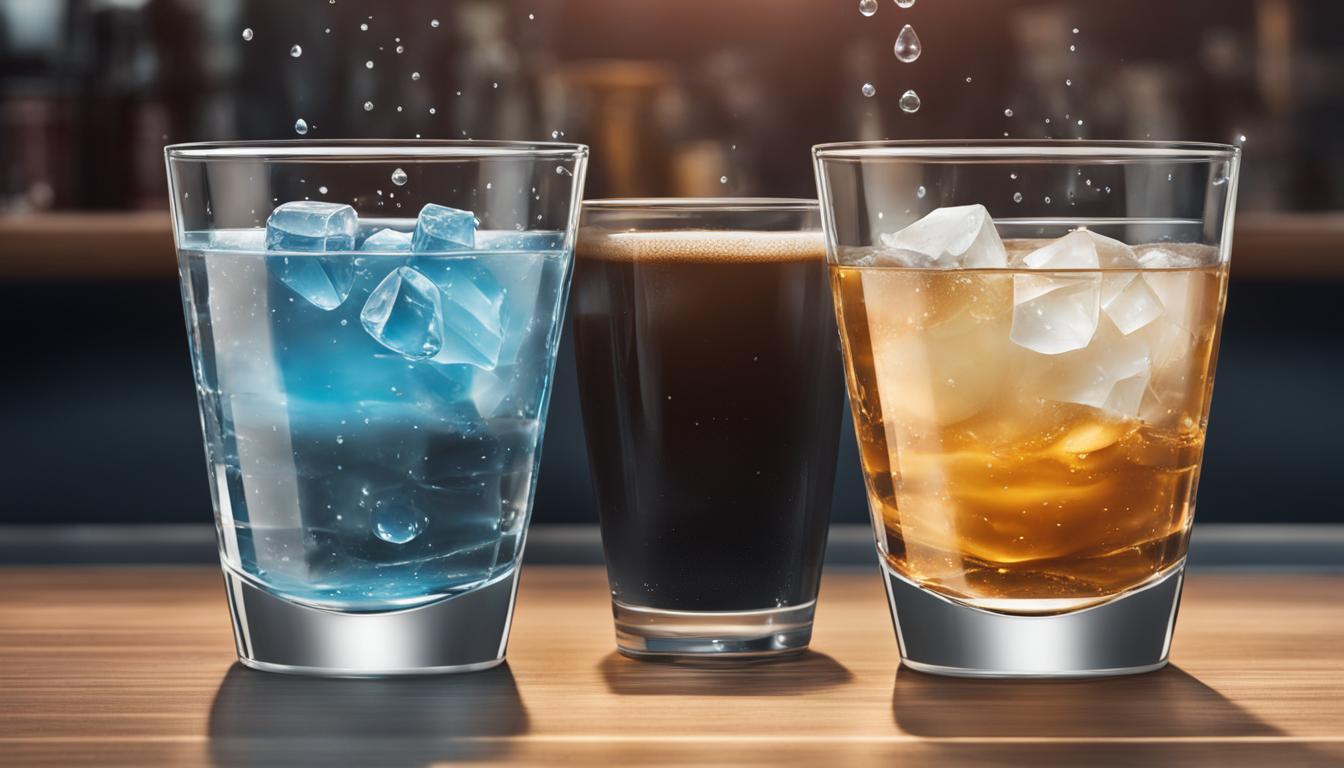
The Bottom Line
In summary, moderate consumption of caffeinated drinks does not have a significant impact on hydration levels. While water should be your main source of fluids, incorporating moderate amounts of caffeine into your daily routine is unlikely to cause dehydration. Just remember to drink plenty of water alongside your favorite caffeinated beverages to maintain optimal hydration.
Sports Drinks and Hydration
When it comes to staying hydrated during intense exercise or sports activities, sports drinks can play a beneficial role. These drinks are specifically formulated to replenish electrolytes and provide carbohydrates that can enhance hydration levels and provide an energy boost. The electrolytes, such as sodium, potassium, and magnesium, help balance fluid levels in the body, which is crucial for optimal performance.
One of the main advantages of sports drinks is their ability to replace electrolytes lost through sweat. During prolonged or intense exercise, the body can lose significant amounts of electrolytes, which can affect muscle function and overall hydration status. Sports drinks also contain carbohydrates, which can help sustain energy levels during prolonged physical activity.
“Sports drinks are formulated to help athletes maintain optimal hydration during intense exercise or sports activities.”
However, it’s important to note that sports drinks are not necessary for everyone. For most individuals engaging in moderate exercise or daily activities, water is sufficient to maintain hydration levels. Sports drinks should be reserved for those engaging in high-intensity exercise for extended periods, such as endurance athletes or individuals participating in strenuous activities in hot environments.
The Role of Electrolytes for Hydration
- Sodium: Helps retain water and maintain fluid balance in the body.
- Potassium: Assists with muscle function and electrolyte balance.
- Magnesium: Plays a role in muscle contraction and relaxation.
Hydration and Weight Loss
When it comes to weight loss, many people focus on diet and exercise, but the role of hydration is often overlooked. Drinking an adequate amount of water can actually support your weight loss efforts in several ways.
1. Promotes Satiety: Water can help you feel full and satisfied, which can prevent overeating. Research suggests that drinking water before a meal can help control calorie intake. By staying hydrated, you can reduce the chances of mindless snacking or excessive portion sizes.
2. Replaces High-Calorie Beverages: Choosing water over sugary drinks like soda or juice can significantly reduce your calorie intake. These beverages often contain added sugars and empty calories, which can hinder your weight loss progress. By opting for water as your primary beverage, you can stay hydrated while cutting out unnecessary calories.
Quote: “Drinking water before meals can reduce your calorie intake and support weight loss.” – Mayo Clinic.
3. Supports Exercise Performance: Hydration plays a crucial role in exercise performance. When you’re well-hydrated, you can maintain optimal energy levels and endurance during workouts. This allows you to push harder and burn more calories. Additionally, proper hydration helps prevent muscle cramps, fatigue, and overheating, which can improve the overall effectiveness of your exercise routine.
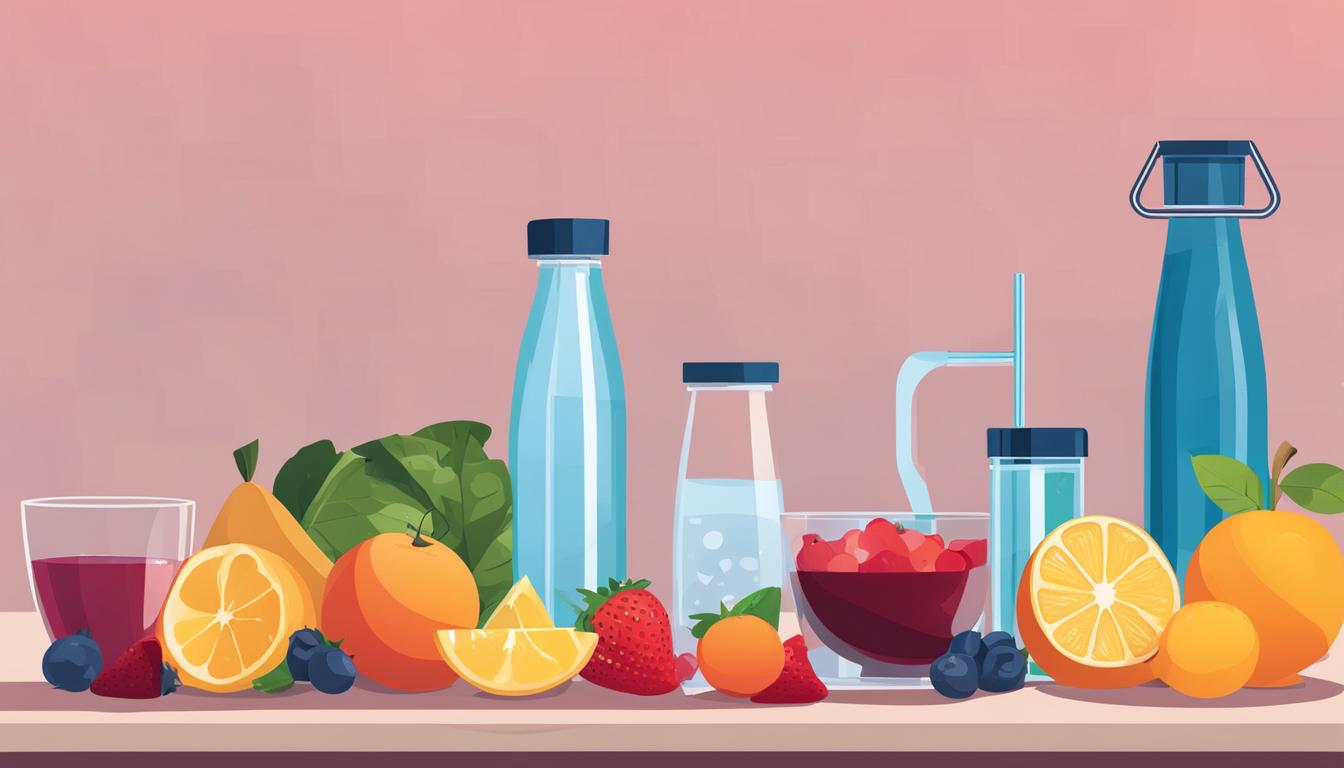
Signs of Dehydration
Dehydration can have significant effects on the body, and it’s important to recognize the signs and symptoms to prevent further complications. Here are some common signs of dehydration:
- Dark urine: When you are dehydrated, your urine may become darker in color, indicating inadequate hydration.
- Dry mouth: Dehydration can cause a dry, sticky feeling in your mouth and throat.
- Fatigue: Lack of proper hydration can leave you feeling tired, weak, and lethargic.
- Extreme thirst: Feeling excessively thirsty even after drinking fluids is a sign that your body needs more hydration.
- Headache: Dehydration can trigger headaches and migraines in some individuals.
- Dizziness: Feeling lightheaded or dizzy can be a result of dehydration.
It’s important to note that these signs may vary from person to person, and some individuals may experience additional symptoms. If you suspect dehydration, it’s crucial to rehydrate by drinking water or consuming hydrating foods and beverages.
The Importance of Prompt Action
“Recognizing the signs of dehydration and taking prompt action is crucial to prevent further complications. Severe dehydration can lead to heat exhaustion, heatstroke, kidney problems, and other serious health issues.”
Children, older adults, and individuals with certain medical conditions are particularly vulnerable to dehydration and should be monitored closely. If you or someone you know is experiencing severe dehydration symptoms, such as confusion, rapid heartbeat, or inability to urinate, seek immediate medical attention.
The Importance of Hydration for Overall Health
Staying properly hydrated is crucial for maintaining optimal health and well-being. Adequate water intake plays a vital role in supporting the body’s essential functions and promoting overall wellness. From nutrient transportation and waste elimination to joint protection and temperature regulation, hydration is key to keeping our bodies running smoothly and efficiently.
One of the major benefits of staying hydrated is the positive impact it has on our overall physical and mental well-being. When we are well-hydrated, our bodies can function at their best, allowing us to feel more energized and focused throughout the day. Proper hydration also helps to support a healthy immune system and aids in digestion, leaving us less susceptible to illnesses and promoting a healthy gut.
Furthermore, maintaining hydration can have a positive effect on our skin health and appearance. When our bodies are adequately hydrated, our skin becomes more elastic, vibrant, and supple. Hydrated skin is less prone to dryness, dullness, and the appearance of fine lines and wrinkles, giving us a more youthful and glowing complexion.
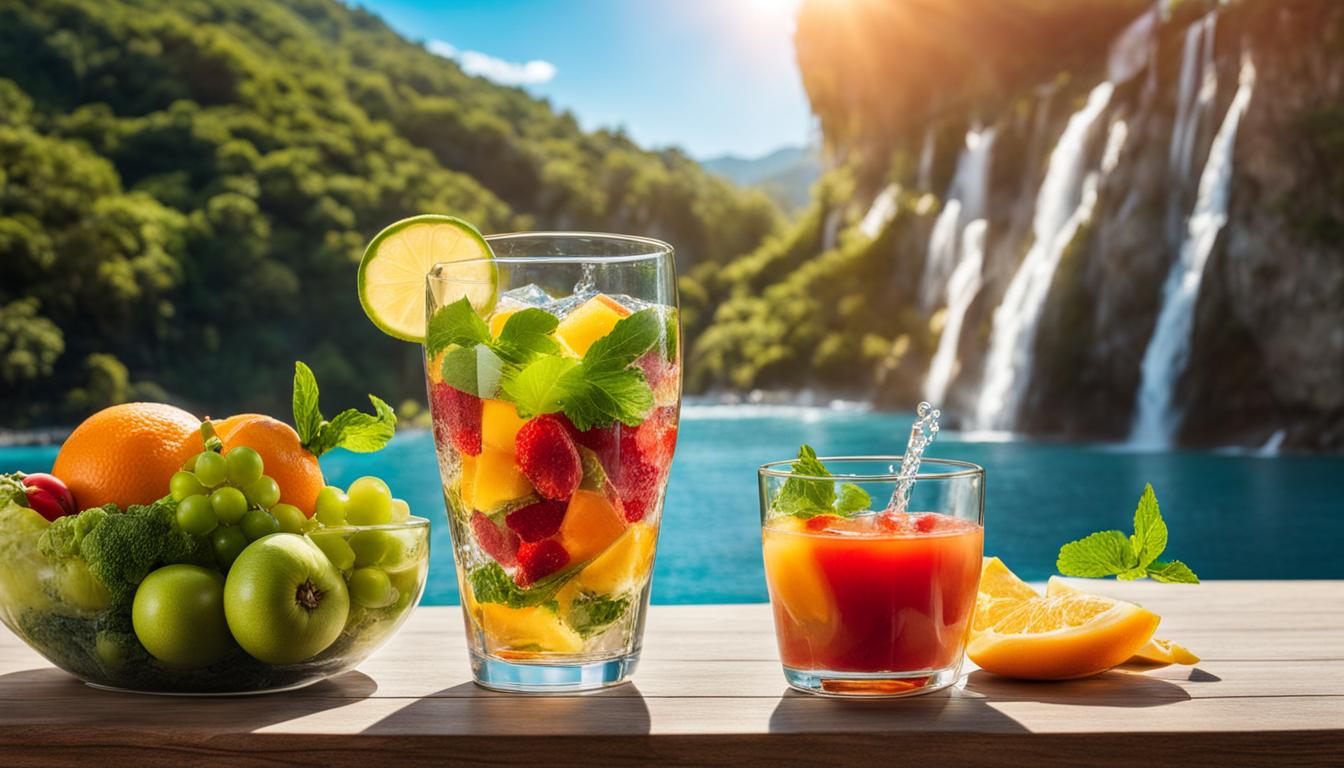
Hydration is not just about drinking plain water; it also includes consuming hydrating foods and beverages. Incorporating fruits and vegetables with high water content, such as watermelon, cucumbers, and oranges, can contribute to our overall hydration levels. Herbal teas and infused water can also provide flavorful alternatives to plain water, making it easier to stay hydrated throughout the day.
In conclusion, the benefits of staying hydrated cannot be overstated. Hydration is not only about quenching our thirst but also about supporting our body’s vital processes and ensuring overall wellness. By prioritizing proper hydration and incorporating hydrating foods and beverages into our daily routine, we can reap the numerous benefits and enjoy a healthier, more vibrant life.
The Effect of Heat on Hydration
The summer season brings with it soaring temperatures and increased outdoor activities, making it essential to pay extra attention to hydration. Hydration in hot weather becomes even more crucial as the body loses water through excessive sweating. Without adequate hydration, the risk of dehydration and its associated health complications significantly increases.
When temperatures rise, it’s important to drink water regularly to replenish the fluids lost through perspiration. In addition to water, consuming hydrating foods, such as watermelon and cucumber, can help maintain hydration levels. These foods have a high water content and can provide a refreshing boost during hot summer days.
It’s important to be mindful of the signs of dehydration, which include thirst, dry mouth, dizziness, and dark-colored urine. Staying hydrated in the summer requires proactive measures, such as carrying a reusable water bottle and drinking water before, during, and after outdoor activities.
In order to prevent overheating and dehydration, it’s also important to avoid leaving plastic water bottles in hot cars. High temperatures can cause chemicals from the plastic to leach into the water, posing potential health risks. By taking proactive steps to prioritize hydration in hot weather, we can ensure our bodies remain properly hydrated, allowing us to enjoy the summer season to the fullest.
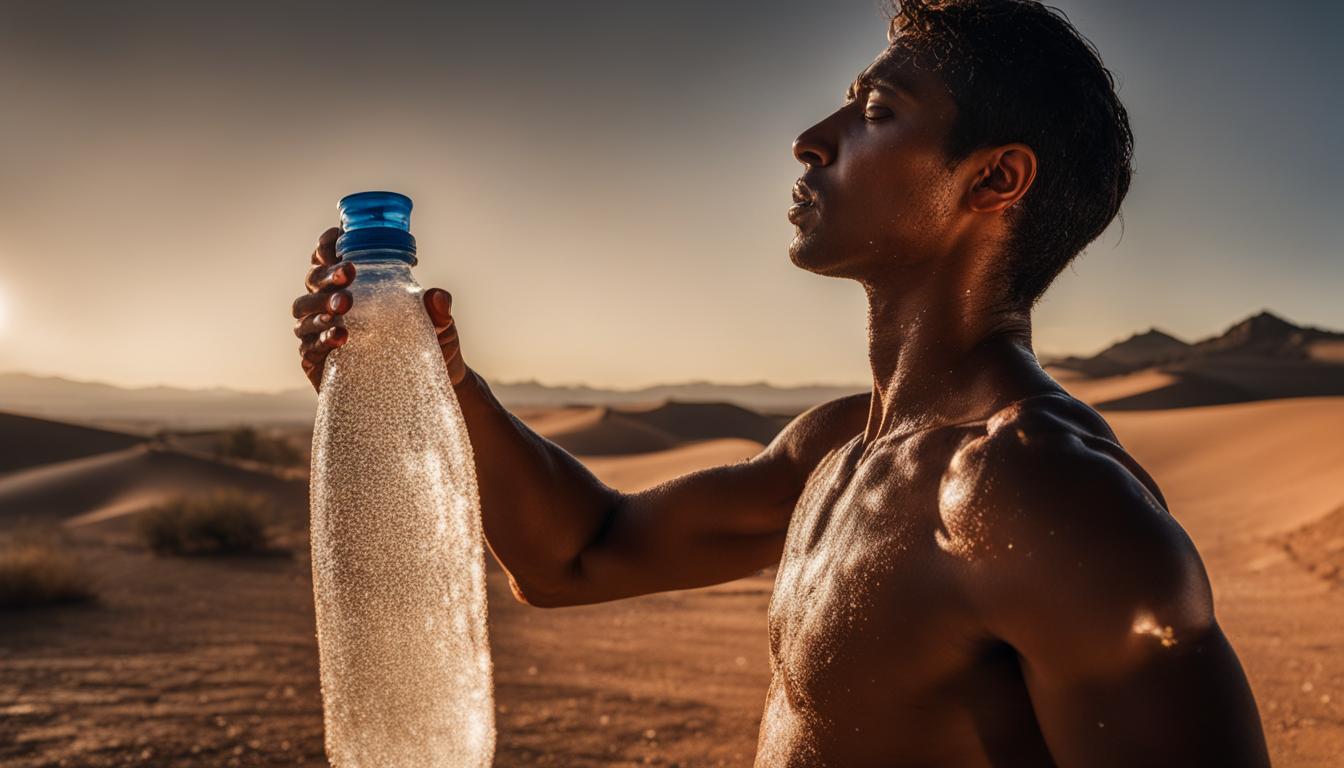
Key Points:
- Hot weather increases water loss through sweating, emphasizing the need for regular hydration.
- Drinking water and consuming hydrating foods are crucial for maintaining hydration levels in the summer.
- Be mindful of dehydration signs and symptoms, and proactively drink water before, during, and after outdoor activities.
- Avoid leaving plastic water bottles in hot cars to minimize the risk of chemical leaching.
Conclusion
Hydration is of utmost importance for maintaining optimal health and overall well-being. It affects various aspects of our body, including heart function, mental clarity, skin elasticity, and productivity. However, it is concerning that many Americans are chronically dehydrated, which can have negative effects on their health.
While drinking enough water is essential, there are other ways to stay hydrated as well. Consuming hydrating foods and beverages can contribute to our overall hydration levels. It’s crucial to strike a balance and not overhydrate, as excessive water intake can lead to complications such as hyponatremia.
Understanding the signs of dehydration and overhydration is vital for maintaining a proper balance. Being aware of symptoms like dark urine, dry mouth, fatigue, extreme thirst, headache, and dizziness can help us identify when our body needs more fluids. Establishing healthy habits and prioritizing hydration in our daily lives is key to staying hydrated for optimal health.
Remember, maintaining proper hydration supports our body’s vital functions and helps prevent various health issues associated with dehydration. So, let’s make it a priority to drink enough water, incorporate hydrating foods and beverages into our diet, and stay mindful of our body’s hydration needs. By doing so, we can ensure that we are taking care of our health and well-being.
FAQ
Why is staying hydrated important?
Staying hydrated is crucial for overall health as it affects heart function, skin elasticity, mental clarity, and productivity.
How can I stay hydrated besides drinking water?
In addition to drinking enough water, you can consume hydrating foods and beverages to maintain hydration balance throughout the day.
How much water should I drink each day?
The recommended daily water intake varies for individuals, but generally, men are advised to drink around 13 cups (3 liters) of water per day, while women should aim for approximately 9 cups (2 liters).
What are the signs of dehydration?
Signs of dehydration include dark urine, dry mouth, fatigue, extreme thirst, headache, and dizziness.
Can caffeine affect hydration?
Caffeinated drinks like coffee, tea, and soda can contribute to daily water intake but should be consumed in moderation. Excessive caffeine intake can lead to headaches and difficulty sleeping.
Are sports drinks necessary for hydration during workouts?
For the majority of people, water is sufficient for hydration during workouts. Sports drinks can be beneficial for individuals engaging in high-intensity exercise for extended periods.
Can drinking water help with weight loss?
Drinking water can contribute to a healthy weight loss plan by promoting a feeling of fullness and helping control calorie intake. However, it should not be seen as a replacement for a balanced diet and exercise.
What are the signs of overhydration?
Overhydration can lead to hyponatremia, which can cause symptoms like mental fog, overeating, and increased stroke risk.
How does heat affect hydration?
Hot weather increases the body’s water loss through sweating, making it crucial to prioritize hydration during the summertime. Drinking water regularly and paying attention to signs of dehydration is important.
Why is hydration important for overall health?
Adequate water intake supports the body’s vital functions, such as nutrient transportation, waste elimination, joint protection, and temperature regulation.

